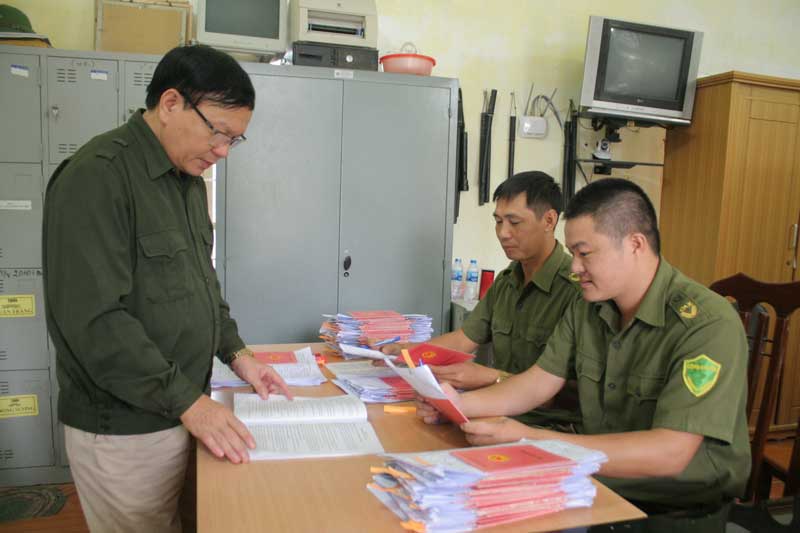
HBO) – The public security force in Thanh Lap commune of Luong Son district, Hoa Binh province, consists of 10 members at present. They have greatly helped with ensuring peace and security in the areas bordering Hanoi capital over the past years.

Police officers of Thanh Lap commune (Luong Son district)
collect information about local residents.
The public security forces in Hoa Binh’s areas
adjacent to Hanoi have boasted cohesive relations for a long time. They have
coordinated to crack down on many crime hotspots and eradicate factors that
could be crime causes. Any incidents happening have been discovered and handled
in a timely manner, regardless of administrative boundaries, thus helping to
ensure political security and social order and safety.
Since the beginning of 2018, to realise the
communal Party Committee’s resolution and the Luong Son district People’s
Committee’s directive on ensuring traffic safety, local police have carried out
a traffic safety promotion plan and boost the "All people protect the
Fatherland’s security” movement.
In the first nine months of this year, Thanh Lap
commune recorded 16 criminal cases, down one from the same period of 2017.
Police have stayed ready in any circumstances, safeguarding political security
and social order and safety.
To obtain this outcome, they have actively
grasped the local situation and taken timely actions since Thanh Lap borders a
big city, making it vulnerable to social and security problems.
Communication activities have also been
promoted. So far this year, local police have worked with agencies and
organisations to hold six meeting to disseminate law, issue 14 warnings about
criminal activities, and compile seven relevant announcements broadcast on the
local public address system.
These communication activities have encouraged
residents to provide police with security information to help deal with many
cases./.
More than just an information technology teacher, Bui Van Nien is an inspiring figure who has nurtured the scientific curiosity and creative spirit of students in Vietnam’s ethnic minority communities.
Da Bac is the most disadvantaged mountainous district in Hoa Binh province, with ethnic minorities accounting for about 90% of its population. Over the past years, the district has mobilised resources to implement ethnic policies to improve the quality of life of local people.
In recent years, Hoa Binh province has consistently prioritised the protection, care, and education of children, particularly those from ethnic minorities and disadvantaged backgrounds, by creating a safe, healthy, and nurturing environment for their all-round development.
The Steering Committee for Tobacco Harm Prevention and Control of Hoa Binh province, in coordination with the Tobacco Harm Prevention and Control Fund, held a ceremony on May 28 in response to the World No Tobacco Day (May 31) and the National No Tobacco Week (from May 25 to 31). The event was chaired by Nguyen Van Toan, Standing Vice Chairman of the provincial People’s Committee and head of the Steering Committee.
Since 2021, the Center for Industrial Promotion and Industrial Development Consulting (CIIDC) under the Department of Industry and Trade has been implementing a school lighting model as part of the plan for using energy efficiently and economically in Hoa Binh Province in the pẻiod of 2021 - 2025. This model not only aims to improve the learning conditions and enhance the education quality, but it also promotes the message of energy saving, energy security, environmental protection and contributes to the goals of socio-economic development.
In the 2024 - 2025 school year, the entire Hoa Binh provincial education sector includes 520 educational institutions and schools. Among them are 13 ethnic boarding schools with 153 classes and 4,487 students. Four of these schools have met national standards, reaching 30.7 percent.



